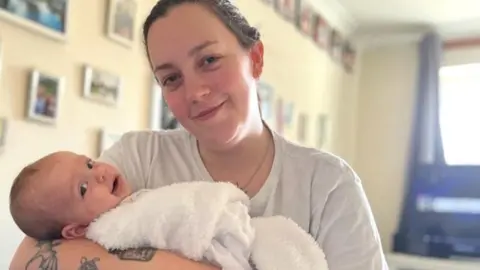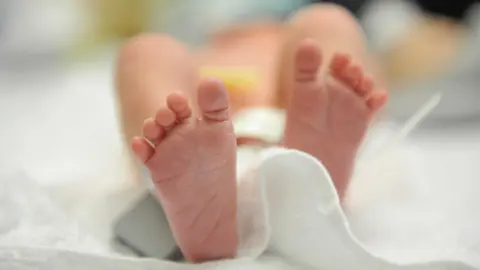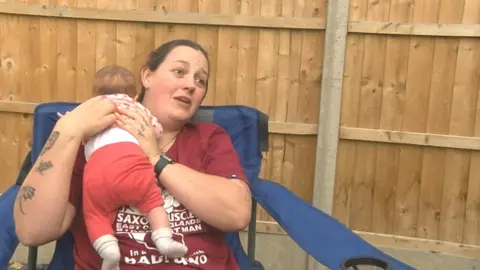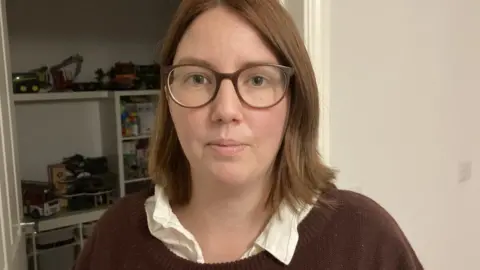Midwife shortage: Father forced to help Stamford mother give birth
 Polly McIntosh-Hurst
Polly McIntosh-HurstA father had to help his partner give birth at home because there were no midwives available and a maternity delivery suite at a hospital was shut.
Polly McIntosh-Hurst said she thought she might die when giving birth to baby Clementine about eight weeks ago.
Her case highlights concern over a national shortage of midwives, according to a health professional.
North West Anglia NHS Foundation Trust, which runs Peterborough City Hospital, declined to comment on the birth.
But Jo Bennis, chief nurse and director of infection, prevention and control, responding to concerns raised by midwives who have contacted the BBC, said: "We have been short of qualified midwives but we have had other roles in these areas to support the teams."
The government said it was aiming to hire an extra 1,200 midwives.

Ms McIntosh-Hurst, from Stamford, Lincolnshire, said she had planned a home birth, but when she went into labour there were no midwives available.
The delivery suite at Peterborough City Hospital was also closed because of a shortage of staff.
She called 999 for an ambulance, but while she was waiting she gave birth with the help of partner Matt Taylor.
"I thought I was going to die... and there are so many things that can go wrong," she said.

Ms Bennis said the hospital had just taken on 14 newly qualified midwives.
She said the shortage, which was a nationally recognised issue, meant that "on occasions potentially safety could have been compromised".
'Pressure of pandemic'
Dr Edward Morris, president of the Royal College of Obstetricians and Gynaecologists (RCOG), and a consultant at the Norfolk and Norwich University Hospital, said: "At the moment, we are certainly looking at around 2,000 to 3,000 midwives fewer than we should have nationally and so that is a matter of concern.
"With the pandemic putting extra pressure on the staff, I think it's very important that we try and encourage midwives to stay in their role and make their working environment more enjoyable, and support them in the work that they do."
Earlier this year, the RCOG and the Royal College of Midwives wrote to NHS trust and board chief executives across the UK about the strain maternity services were under.

In the East of England in the last year, 37% more midwives left the NHS than joined.
Last month a whistle-blowing letter claimed midwives at West Suffolk Hospital in Bury St Edmunds were "exhausted and broken" and maternity was "consistently short staffed", but the hospital said it provided a "safe and caring service".
A national vigil called March with Midwives is being held in towns and cities across England on Sunday, including in Norwich and Ipswich.
One of those involved in the march - midwife Hannah Bridges, from Suffolk - has gone part-time because of stress.
She said she was "emotionally drained" and "working shifts with no break, not having time to drink or something to eat".
A Department for Health and Social Care spokeswoman said: "Midwives do an incredibly important job and we know how challenging it has been for those working during the pandemic.
"There are more midwives working in the NHS now than at any other time in its history and we are aiming to hire 1,200 more with a £95 million recruitment drive."
Politics East airs on BBC One in the East on Sunday, 21 November at 10:00 BST and can be viewed on the BBC iPlayer afterwards.

Find BBC News: East of England on Facebook, Instagram and Twitter. If you have a story suggestion email [email protected]
